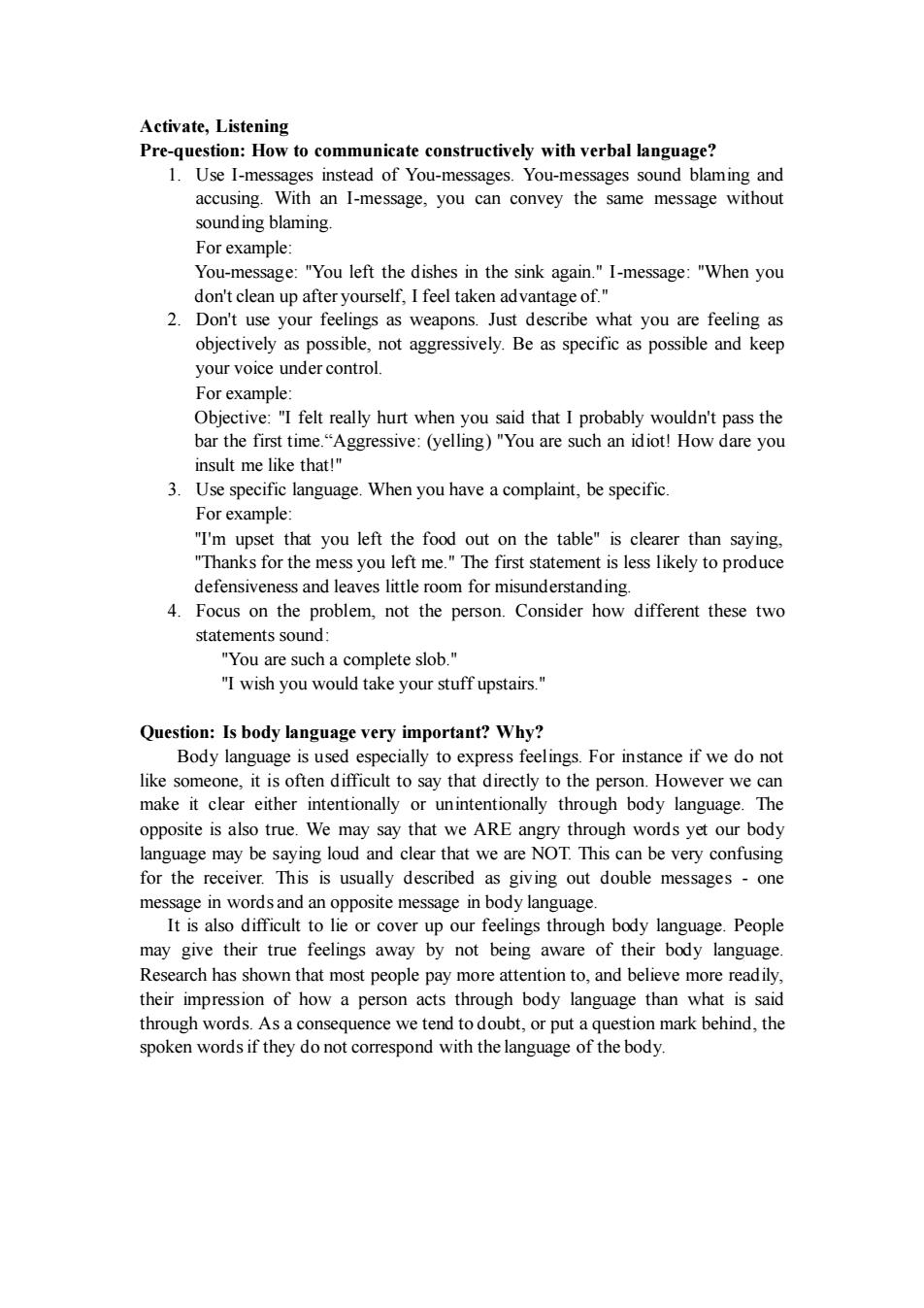
Activate,Listening Pre-question:How to communicate constructively with verbal language? 1.Use I-messages instead of You-messages.You-messages sound blaming and accusing.With an I-message,you can convey the same message without sound ing blaming. For example: You-message:"You left the dishes in the sink again."I-message:"When you don't clean up after yourself,I feel taken advantage of." 2.Don't use your feelings as weapons.Just describe what you are feeling as objectively as possible,not aggressively.Be as specific as possible and keep your voice under control. For example: Objective:"I felt really hurt when you said that I probably wouldn't pass the bar the first time."Aggressive:(yelling)"You are such an idiot!How dare you insult me like that!" 3.Use specific language.When you have a complaint,be specific. For example: "I'm upset that you left the food out on the table"is clearer than saying, "Thanks for the mess you left me."The first statement is less likely to produce defensiveness and leaves little room for misunderstanding. 4.Focus on the problem,not the person.Consider how different these two statements sound: "You are such a complete slob." "I wish you would take your stuff upstairs." Question:Is body language very important?Why? Body language is used especially to express feelings.For instance if we do not like someone,it is often difficult to say that directly to the person.However we can make it clear either intentionally or unintentionally through body language.The opposite is also true.We may say that we ARE angry through words yet our body language may be saying loud and clear that we are NOT.This can be very confusing for the receiver.This is usually described as giving out double messages-one message in words and an opposite message in body language. It is also difficult to lie or cover up our feelings through body language.People may give their true feelings away by not being aware of their body language. Research has shown that most people pay more attention to,and believe more readily, their impression of how a person acts through body language than what is said through words.As a consequence we tend to doubt,or put a question mark behind,the spoken words if they do not correspond with the language of the body
Activate, Listening Pre-question: How to communicate constructively with verbal language? 1. Use I-messages instead of You-messages. You-messages sound blaming and accusing. With an I-message, you can convey the same message without sounding blaming. For example: You-message: "You left the dishes in the sink again." I-message: "When you don't clean up after yourself, I feel taken advantage of." 2. Don't use your feelings as weapons. Just describe what you are feeling as objectively as possible, not aggressively. Be as specific as possible and keep your voice under control. For example: Objective: "I felt really hurt when you said that I probably wouldn't pass the bar the first time.“Aggressive: (yelling) "You are such an idiot! How dare you insult me like that!" 3. Use specific language. When you have a complaint, be specific. For example: "I'm upset that you left the food out on the table" is clearer than saying, "Thanks for the mess you left me." The first statement is less likely to produce defensiveness and leaves little room for misunderstanding. 4. Focus on the problem, not the person. Consider how different these two statements sound: "You are such a complete slob." "I wish you would take your stuff upstairs." Question: Is body language very important? Why? Body language is used especially to express feelings. For instance if we do not like someone, it is often difficult to say that directly to the person. However we can make it clear either intentionally or unintentionally through body language. The opposite is also true. We may say that we ARE angry through words yet our body language may be saying loud and clear that we are NOT. This can be very confusing for the receiver. This is usually described as giving out double messages - one message in words and an opposite message in body language. It is also difficult to lie or cover up our feelings through body language. People may give their true feelings away by not being aware of their body language. Research has shown that most people pay more attention to, and believe more readily, their impression of how a person acts through body language than what is said through words. As a consequence we tend to doubt, or put a question mark behind, the spoken words if they do not correspond with the language of the body